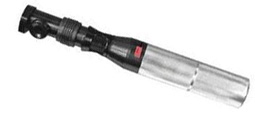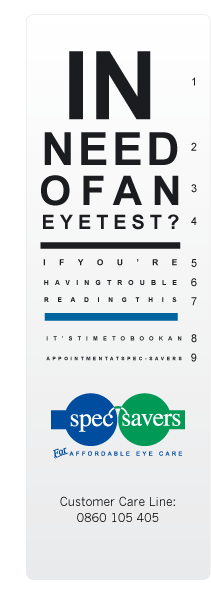It may surprise you that having your eyes tested regularly may result in early detection of a serious illness. Eyes are sensitive indicators and may reveal vision problems, eye diseases and general health irregularities long before any obvious physical symptoms exist. Health care professionals recommend that all people should have periodic and thorough eye tests as part of their routine primary health care.
At Spec-Savers you can expect the following assessment whilst undergoing an eye test:
Step 1: Health and Medication History Assessment
As part of your vision history, your Spec-Savers optometrist may ask you the following questions:
 Your overall health and that of your immediate family.
Your overall health and that of your immediate family.- The medications you are taking (prescription and over-the-counter).
- Questions about high blood pressure (hypertension), diabetes, smoking, and sun exposure.
- How well you can see at present, including any recent changes in your vision.
- Eye diseases that you or your family members have had, including macular degeneration and glaucoma.
- Previous eye treatments, surgeries, or injuries.
- The date of your last eye examination.
- Are you having any problems with your vision?
- Do you have any allergies?
- Finally, your optometrist will ask you if you have any eye complaints such as distance or near vision difficulties or headaches.
Your own health and that of your family's will give the optometrist an indication of any issues that may be affecting, or could affect, your vision.
Step 2: Visual Acuity
 Amongst the first tests performed in a comprehensive eye test are visual acuity tests. Using a method known as refraction helps determine the sharpness or clarity of both your near (reading) and distance vision. This includes using different lenses to determine if your vision can be improved or corrected with regular spectacles or contact lenses.
Amongst the first tests performed in a comprehensive eye test are visual acuity tests. Using a method known as refraction helps determine the sharpness or clarity of both your near (reading) and distance vision. This includes using different lenses to determine if your vision can be improved or corrected with regular spectacles or contact lenses.
You will be required to complete a subjective test involving reading a letter chart through a choice of lenses. The optometrist will also perform an objective test using an eye instrument called a retinoscope.
Step 3: Eye Muscle Assessment
Your Spec-Savers optometrist will check your eye muscle balance to make sure your eyes are co-ordinated and working together in all directions, and that the images formed by each eye are correctly aligned.
Step 4: Interior & Exterior Eye Examination
Your Spec-Savers optometrist will carefully examine the exterior of your eye whilst conducting the following assessments:
- Eye Pressure test - A test of intra-ocular pressure.
- Detailed interior eye examination, which can give an overall picture of your eyes and your general health. Various parts of the eye such as the lens, the vitreous and the fundus (includes retina and optic nerve) are assessed.
To book an eye test contact your nearest store or our Customer Care Line: 0860 105 405
 From the results of your eye test your Spec-Savers optometrist will be able to determine whether you suffer from farsightedness, nearsightedness, astigmatism or have no optical error.
From the results of your eye test your Spec-Savers optometrist will be able to determine whether you suffer from farsightedness, nearsightedness, astigmatism or have no optical error.- Each eye will be tested separately and an accurate prescription will be determined by your Spec-Savers optometrist.
- Your optometrist will now have a complete overview of your eyes and will explain and discuss any prescriptions or instructions that are necessary. You will be introduced to one of our optical assistants or dispensers who will assist you in selecting a new pair of spectacles and booking your next appointment.
- If your eye examination reveals any medical condition requiring further examination, your Spec-Savers optometrist will refer you to your family doctor, or an ophthalmologist.
Eye Test
If you are already wearing spectacles our Spec-Savers optometrist will examine your vision and compare it with any previous results to give an accurate guide to your eyes’ visual ability and health.
- Your current prescription will be assessed according to your current prescription of each lens.
- This is important as the optometrist will need to know whether your prescription is different from the new one and whether it should be changed.
At Spec-Savers we recommend that you have regular eye test every 12 – 24 months.
In some cases, your Spec-Savers optometrist may conduct other, more specialised eye tests such as:
- Field of Vision Test - used to detect blind spots, which may indicate illnesses of the eyes.
- Slit Lamp Test - used to detect any eye defects in the interior segment of the eye.
- Tonometry Test - tests eye pressure which can assist to early detection of glaucoma.
- Colour Vision Test - used to detect the inability to perceive certain colours.
- Keratometry Test - measures the curvatures of the cornea and used for contact lens fitting and also can assist in the early detection of corneal defects.
